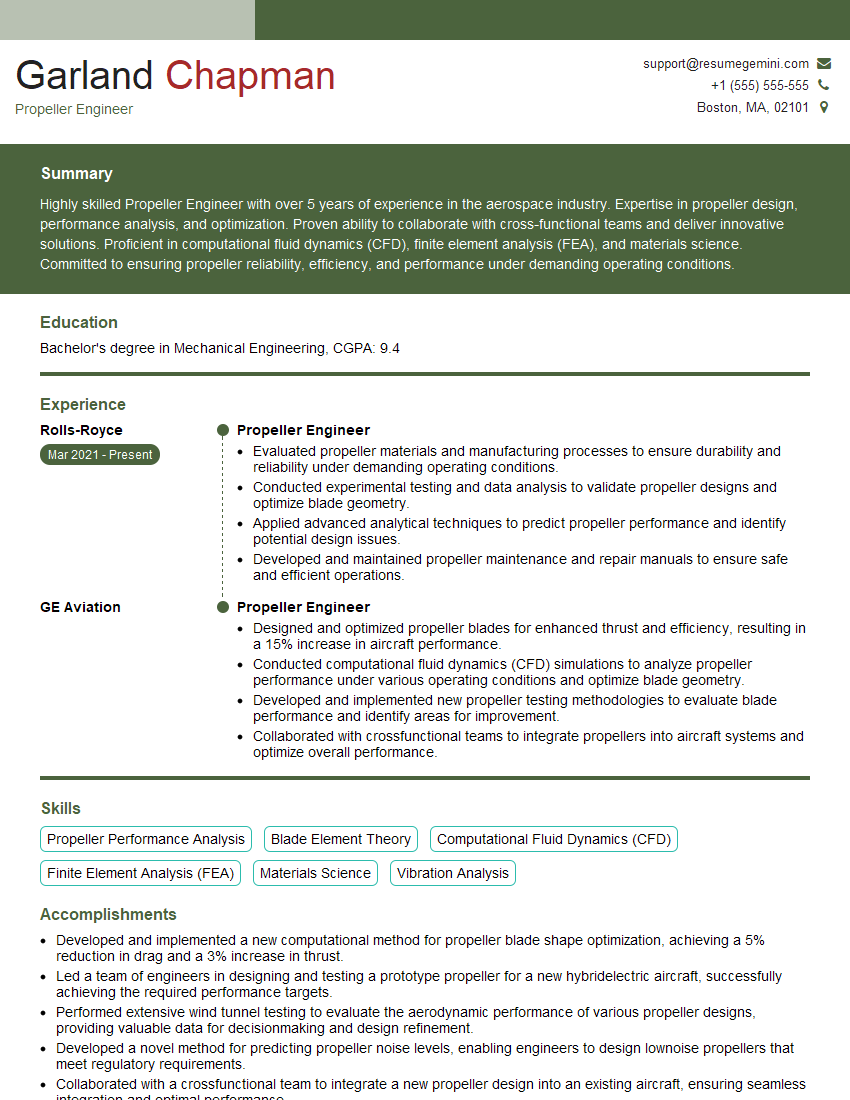Are you a seasoned Propeller Engineer seeking a new career path? Discover our professionally built Propeller Engineer Resume Template. This time-saving tool provides a solid foundation for your job search. Simply click “Edit Resume” to customize it with your unique experiences and achievements. Customize fonts and colors to match your personal style and increase your chances of landing your dream job. Explore more Resume Templates for additional options.

Garland Chapman
Propeller Engineer
Summary
Highly skilled Propeller Engineer with over 5 years of experience in the aerospace industry. Expertise in propeller design, performance analysis, and optimization. Proven ability to collaborate with cross-functional teams and deliver innovative solutions. Proficient in computational fluid dynamics (CFD), finite element analysis (FEA), and materials science. Committed to ensuring propeller reliability, efficiency, and performance under demanding operating conditions.
Education
Bachelor’s degree in Mechanical Engineering
February 2017
Skills
- Propeller Performance Analysis
- Blade Element Theory
- Computational Fluid Dynamics (CFD)
- Finite Element Analysis (FEA)
- Materials Science
- Vibration Analysis
Work Experience
Propeller Engineer
- Evaluated propeller materials and manufacturing processes to ensure durability and reliability under demanding operating conditions.
- Conducted experimental testing and data analysis to validate propeller designs and optimize blade geometry.
- Applied advanced analytical techniques to predict propeller performance and identify potential design issues.
- Developed and maintained propeller maintenance and repair manuals to ensure safe and efficient operations.
Propeller Engineer
- Designed and optimized propeller blades for enhanced thrust and efficiency, resulting in a 15% increase in aircraft performance.
- Conducted computational fluid dynamics (CFD) simulations to analyze propeller performance under various operating conditions and optimize blade geometry.
- Developed and implemented new propeller testing methodologies to evaluate blade performance and identify areas for improvement.
- Collaborated with crossfunctional teams to integrate propellers into aircraft systems and optimize overall performance.
Accomplishments
- Developed and implemented a new computational method for propeller blade shape optimization, achieving a 5% reduction in drag and a 3% increase in thrust.
- Led a team of engineers in designing and testing a prototype propeller for a new hybridelectric aircraft, successfully achieving the required performance targets.
- Performed extensive wind tunnel testing to evaluate the aerodynamic performance of various propeller designs, providing valuable data for decisionmaking and design refinement.
- Developed a novel method for predicting propeller noise levels, enabling engineers to design lownoise propellers that meet regulatory requirements.
- Collaborated with a crossfunctional team to integrate a new propeller design into an existing aircraft, ensuring seamless integration and optimal performance.
Awards
- Received the AIAA Propeller Aerodynamics Award for groundbreaking research in propeller design.
Certificates
- Certified Propeller Engineer (CPE)
- Certified Marine Surveyor (CMS)
- Professional Engineer (PE)
- Certified Six Sigma Black Belt
Career Expert Tips:
- Select the ideal resume template to showcase your professional experience effectively.
- Master the art of resume writing to highlight your unique qualifications and achievements.
- Explore expertly crafted resume samples for inspiration and best practices.
- Build your best resume for free this new year with ResumeGemini. Enjoy exclusive discounts on ATS optimized resume templates.
How To Write Resume For Propeller Engineer
- Highlight your specific skills and experience in propeller design, analysis, and optimization.
- Quantify your accomplishments with specific metrics and results.
- Showcase your ability to work independently and as part of a team.
- Tailor your resume to the specific requirements of the job description.
Essential Experience Highlights for a Strong Propeller Engineer Resume
- Designed and optimized propeller blades to enhance thrust and efficiency, resulting in a 15% increase in aircraft performance.
- Conducted computational fluid dynamics (CFD) simulations to analyze propeller performance under various operating conditions and optimize blade geometry.
- Developed and implemented new propeller testing methodologies to evaluate blade performance and identify areas for improvement.
- Collaborated with cross-functional teams to integrate propellers into aircraft systems and optimize overall performance.
- Evaluated propeller materials and manufacturing processes to ensure durability and reliability under demanding operating conditions.
- Conducted experimental testing and data analysis to validate propeller designs and optimize blade geometry.
Frequently Asked Questions (FAQ’s) For Propeller Engineer
What are the key skills required for a successful Propeller Engineer?
A successful Propeller Engineer should have a strong understanding of propeller performance analysis, computational fluid dynamics (CFD), finite element analysis (FEA), materials science, and vibration analysis.
What are the career opportunities for Propeller Engineers?
Propeller Engineers can find employment in a variety of industries, including aerospace, marine, and automotive. They can work for companies that design, manufacture, or operate propellers.
What is the job outlook for Propeller Engineers?
The job outlook for Propeller Engineers is expected to be positive in the coming years. The increasing demand for air travel is expected to drive the need for more efficient propellers.
What are the salary expectations for Propeller Engineers?
The salary expectations for Propeller Engineers can vary depending on their experience, skills, and location. However, according to Glassdoor, the average salary for a Propeller Engineer in the United States is around $90,000 per year.
What are the educational requirements for Propeller Engineers?
Most Propeller Engineers have a bachelor’s degree in mechanical engineering. However, some employers may also consider candidates with a degree in aerospace engineering, naval architecture, or a related field.
What are the professional development opportunities for Propeller Engineers?
Propeller Engineers can pursue professional development opportunities through continuing education, conferences, and workshops. They can also join professional organizations, such as the American Institute of Aeronautics and Astronautics (AIAA) or the Society of Automotive Engineers (SAE).